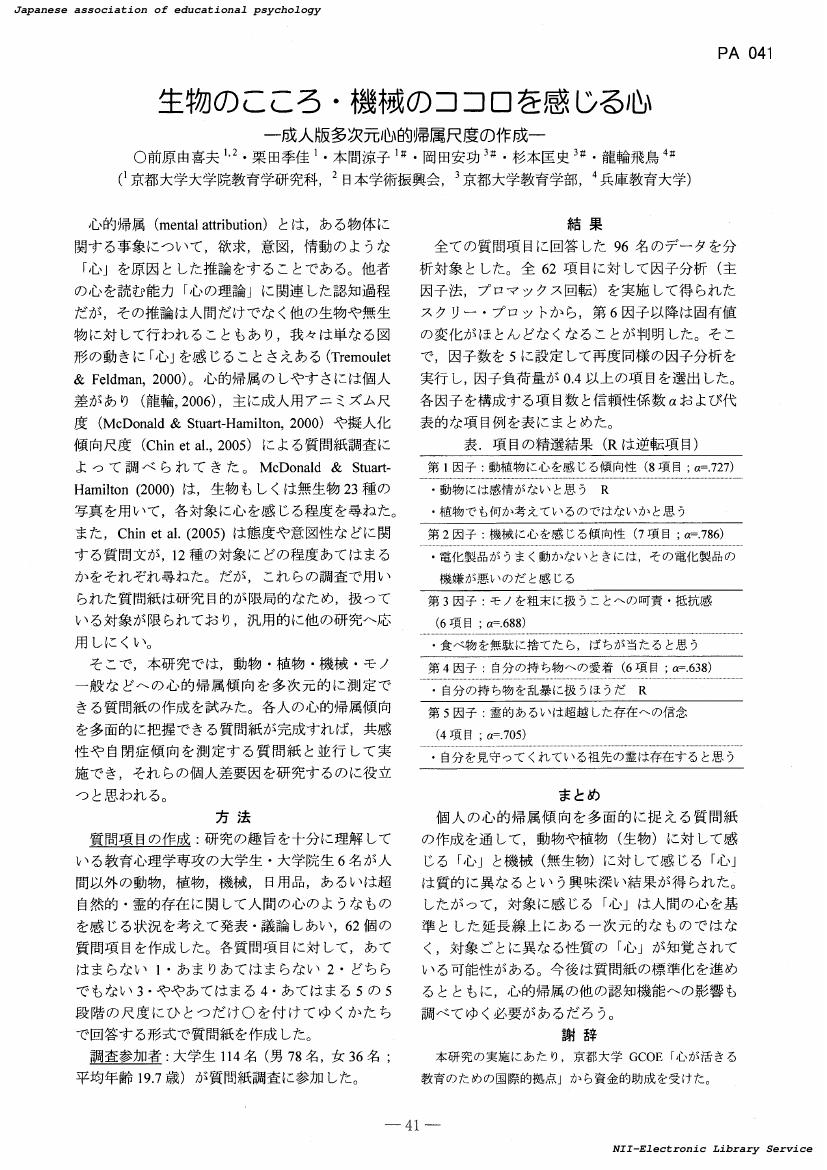29 0 0 0 OA 謝罪とアルコール摂取が怒り感情の表出に及ぼす影響 ──鉄道利用場面の実験的検討──
- 著者
- 岡田 安功 宮地 由芽子 鶴身 孝介 楠見 孝
- 出版者
- 公益社団法人 日本心理学会
- 雑誌
- 心理学研究 (ISSN:00215236)
- 巻号頁・発行日
- pp.94.21042, (Released:2023-04-28)
- 参考文献数
- 40
This study investigated the effect of accepting apologies and alcohol intake on anger expression through a laboratory experiment simulating a railway use situation. Fifty adult men participated in this study. 24 men were assigned to the alcohol group and 26 men were assigned to the non-alcohol group. After drinking either an alcoholic or a non-alcoholic beverage, they watched an animation that showed a frustrating situation at a train station. Following the animation, they watched three types of videos depicting staff responses to a passenger: “apology in a businesslike tone,” “apology with bowing in a polite manner,” and “non-apology.” After watching each video, the participants physically expressed their anger by hand grip strength using a hand dynamometer imagining that they were in the video situation. Only the participants in the alcohol group expressed their anger more strongly after watching “apology in a businesslike tone” than “apology with bowing in a polite manner.” These results suggest that explicit polite and non-verbal expressions of apology to passengers by staff are important to reducing anger expressed by intoxicated passengers.
14 0 0 0 IR 涼宮ハルヒの憂鬱 : 非日常性の規範的構造 (誌上シンポジウム『涼宮ハルヒの憂鬱』)
- 著者
- 岡田 安功
- 出版者
- 静岡大学
- 雑誌
- 静岡大学情報学研究 (ISSN:13420909)
- 巻号頁・発行日
- vol.18, pp.52-58, 2012
3 0 0 0 IR 誌上シンポジウム『涼宮ハルヒの憂鬱』
2 0 0 0 OA 涼宮ハルヒの憂鬱 : 非日常性の規範的構造 (誌上シンポジウム『涼宮ハルヒの憂鬱』)
- 著者
- 岡田 安功
- 出版者
- 静岡大学情報学部
- 雑誌
- 静岡大学情報学研究 (ISSN:13420909)
- 巻号頁・発行日
- vol.18, pp.52-58, 2013-03-29
1 0 0 0 OA 謝罪とアルコール摂取が怒り感情の表出に及ぼす影響 ──鉄道利用場面の実験的検討──
- 著者
- 岡田 安功 宮地 由芽子 鶴身 孝介 楠見 孝
- 出版者
- 公益社団法人 日本心理学会
- 雑誌
- 心理学研究 (ISSN:00215236)
- 巻号頁・発行日
- vol.94, no.2, pp.109-119, 2023 (Released:2023-06-25)
- 参考文献数
- 40
This study investigated the effect of accepting apologies and alcohol intake on anger expression through a laboratory experiment simulating a railway use situation. Fifty adult men participated in this study. 24 men were assigned to the alcohol group and 26 men were assigned to the non-alcohol group. After drinking either an alcoholic or a non-alcoholic beverage, they watched an animation that showed a frustrating situation at a train station. Following the animation, they watched three types of videos depicting staff responses to a passenger: “apology in a businesslike tone,” “apology with bowing in a polite manner,” and “non-apology.” After watching each video, the participants physically expressed their anger by hand grip strength using a hand dynamometer imagining that they were in the video situation. Only the participants in the alcohol group expressed their anger more strongly after watching “apology in a businesslike tone” than “apology with bowing in a polite manner.” These results suggest that explicit polite and non-verbal expressions of apology to passengers by staff are important to reducing anger expressed by intoxicated passengers.
1 0 0 0 OA PA041 生物のこころ・機械のココロを感じる心 : 成人版多次元心的帰属尺度の作成
- 著者
- 前原 由喜夫 栗田 季佳 本間 涼子 岡田 安功 杉本 匡史 龍輪 飛鳥
- 出版者
- 一般社団法人 日本教育心理学会
- 雑誌
- 日本教育心理学会総会発表論文集 第51回総会発表論文集 (ISSN:21895538)
- 巻号頁・発行日
- pp.41, 2009 (Released:2017-03-30)
